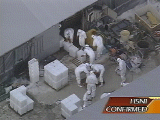Bird flu in Japan

Tests have confirmed that bird flu detected in chickens in southern Japan was the virulent H5N1 strain, according to the Japanese Agricultural Ministry.
About 4,000 chickens died last week at a farm in Kiyotake town in Miyazaki prefecture. On Tuesday, further tests by the National Institute of Animal Health in Tsukuba identified the virus as H5N1, Agricultural Ministry official Hiroyuki Ozono said. The government has banned the shipment of eggs and nearly 200,000 chickens at 16 farms within about a 6-mile radius of the affected farm, where local authorities were to take further disinfectant measures Tuesday.
NHK also reports that Hong Kong has banned imports of chicken from Japan. It is Japan's first confirmed case of the H5N1 strain since 2004, when the toxic virus killed poultry in Yamaguchi, Oita, and Kyoto prefectures. The deadly bird flu strain has been spreading mainly in Asia, but has also been detected in Africa and Europe.

Comments
As for those human disease concerns, my friend, Bill Sardi, who is a medical journalist, has written on this topic quite bit: Bird Flu.
What researchers are concerned about is that the H5N1 ("birdflu") virus is similar to the Spanish flu virus that killed millions around 1918. If that is the case, and the H5N1 mutates in a similar way, we could be in very serious trouble. Airports closing down, no food trade, you name it, we would be in the middle of a panic.
That seems to be where the uncertainity is right now. Adopting the precautionary principle, and taking action rather than letting factory farms all over the world continue to spread the virus in its current form is probably the best strategy, in my humble opinion.
If people had any clue about the unsanitary condition at the factory farms, they would not eat chicken. Then they would have to close down, or clean up. That would be a better strategy, of course.
A third strategy is mass vaccinations, which I am also not a supporter of.